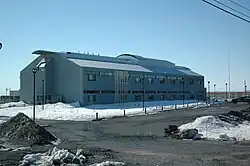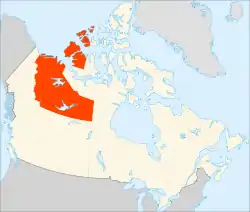
Higher education in the Northwest Territories traces the development and expansion of higher education (also described as post-secondary or tertiary level education) in Canada's Northwest Territories. In Canada, education is a provincial or territorial concern and there is no national regulation nor accrediting body.
There is only one post-secondary institution in the NWT: Aurora College.
The former Arctic College was split into Aurora College and Nunavut Arctic College when Nunavut Territory was created in 1999. Aurora College has campuses in Inuvik, Fort Smith and Yellowknife. It has learning centres in many other communities in the NWT.
There has been an evolution of the land area which comprises the North-West Territories since it was first created in 1870. This article has some chronology of the higher education of the Northwest Territories before the separation of Nunavut in 1999.[1]
History
Up to 1945, the Anglican and Roman Catholic church organizations and missions were mainly responsible for education in the Northwest Territories, with schools and nearby student residences typically being set up in higher populated towns. Starting in 1959, the federal government of Canada began programs that would see it taking more interest and involvement in the Territories' system of education. During the 1960s the government built schools in the communities where indigenous peoples had recently settled and recruited teachers to staff these new schools.[2] By 1969, power over education was officially transferred over to the government of the Northwest Territories under its Department of Education.[3]
In 1969, the Adult Vocational Training Centre (AVTC) was established at Fort Smith.[4] By 1977, it was made responsible for all vocational training in the Northwest Territories.[5] AVTC was officially declared a college by the Northwest Territories Legislative Assembly in 1981 and was renamed Thebacha College.[6] To institute a model of education that better served the community at large and not just those requiring technical skills, Arctic College was established in 1984 in both Fort Smith and Iqaluit and grew rapidly to consist of campuses across all regions of the NWT. In 1984 the Great Slave Helicopters Flight Training Centre opened by Rodney Wood and Gabe Devenyi, which represented one of the few Yellowknife Career Colleges and Trade Schools.[7] By 1987, it was agreed that community learning centres across the North would join the college system, a process which was completed in 1990.[4]
In 1991, Thomas Wanderlake brought an Academy of Learning College franchise to Yellowknife to offer diplomas in subjects not covered by other institutions and using an educational model that offered flexibility to the lives of Northerners.[8]
In 1995, Arctic College was divided into Aurora College in the Western Arctic, and Nunavut Arctic College in the Eastern Arctic in order to strengthen adult and post-secondary education across the North and focus on meeting community needs.[5][9] In that same year, The Science Institute of the Northwest Territories, which was established in 1984, was split and merged by the NWT Legislative Assembly into both institutions.[4] In 1999, The Nunavut Act reorganizes the Northwest Territories into two jurisdictions: The Northwest Territories and Nunavut.[10]
In 2001 and 2002, Aurora College implemented four literacy projects with funding from Human Resources and Social Development Canada to support increasing literacy across the territory: Northwest Territories International Adult Literacy and Skills Survey (IALSS) 2002, Family and Community Literacy Development Project, NWT Literacy Council (NWTLC) projects, and WOW!: Wonder of Words Newspaper for At-Risk Youth.[11] In 2006, 20% or 8292.8 persons[12] had a post secondary education out of the 41,464 residents of the Northwest Territories.[13]
Structure
The territorial Department of Education, Culture and Employment is the government agency responsible for post-secondary education in the Northwest territories. They have recognized 2 post-secondary institutions: Aurora College, which has core public funding, and formerly an Academy of Learning College.[8] A third college, Collège nordique francophone, provides education to French-speaking residents of the Territories.
[14] In addition, Great Slave Helicopters Flight Training Centre applies Global Positioning Systems training for helicopter pilot education.[15]
See also
References
- ↑ "The Northwest Territories - Canadian Confederation". Library and Archives - Canada Collections Canada. 2005-05-02. Archived from the original on 2008-05-22. Retrieved 2008-06-19.
- ↑ "Northwest Territories: V. Education and Cultural Life (n.d.). Retrieved on July 05, 2008". Archived from the original on November 1, 2009.
- ↑ "Moffitt, P. (n.d.). A History of Nursing Education in the Northwest Territories The Northern Nursing Program at Aurora CollegeRetrieved on July 06, 2008" (PDF). Archived from the original (PDF) on July 6, 2011. Retrieved July 9, 2008.
- 1 2 3 http://www.auroracollege.nt.ca/_live/pages/wpPages/AboutHistory.aspx Aurora College (n.d.). About Aurora College and our History. Retrieved on June 19, 2008
- 1 2 Hilyer, G. M. (1997). Higher education in the Northwest Territories. In G. Jones (Ed.), Higher education in Canada: Different systems, different perspectives. New York, NY: Garland Publishing, p. 310.
- ↑ Hilyer, G. M. (1997). Higher education in the Northwest Territories. In G. Jones (Ed.), Higher education in Canada: Different systems, different perspectives. New York, NY: Garland Publishing, pp. 310-311.
- ↑ "Profile of Career College/Trade School". canadian-universities.net. 2003–2008. Retrieved 2008-06-19.
- 1 2 "Archived copy". Archived from the original on 2014-08-19. Retrieved 2013-01-10.
{{cite web}}: CS1 maint: archived copy as title (link) - ↑ Northwest Territories: Education(n.d.). The Canadian Encyclopedia Retrieved on July 05, 2008
- ↑ Justice Canada (1993). "Nunavut Act". Retrieved 2007-04-26.
- ↑ "National Literacy Secretariat - Project Funding 2001-2002 (Northwest Territories)". Human Resources and Social Development Canada. Government of Canada. 2004-11-16. Archived from the original on 2008-02-19. Retrieved 2008-06-19.
- ↑ "Educational Portrait of Canada, 2006 Census: Provincial and territorial highlights". Statistics Canada, Census of Population and Housing. Government of Canada. 2008-03-13. Retrieved 2008-06-19.
- ↑ "2006 Census Profile for Northwest Territories" (PDF). Statistics Canada, Census of Population and Housing. BC Stats. 2006. Retrieved 2008-06-19.
- ↑ "About Us". Academy of Learning in Yellowknife. canadian-universities.net. 2003–2008. Archived from the original on 2005-08-30. Retrieved 2008-06-19.
- ↑ "Yellowknife Career Colleges and Trade Schools". canadian-universities.net. 2003–2008. Retrieved 2008-06-19.
